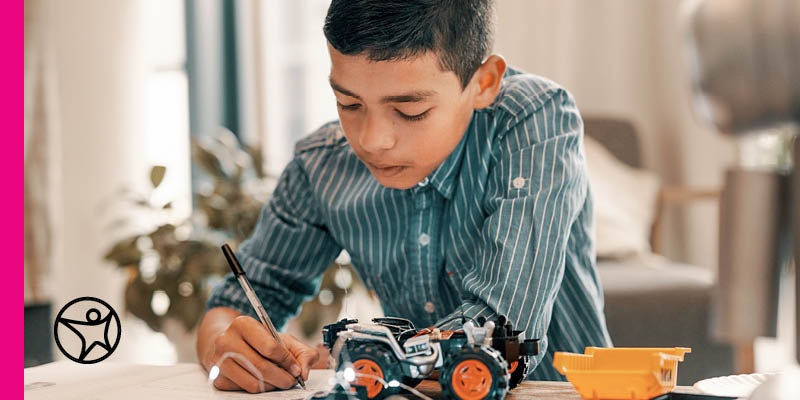How to Help High School Students Prepare for Midterm Exams
by Julie Hersum
byConnections Academy
3 min to readIs my child advanced for their age? Should my child be in a gifted program? What does being “gifted” actually mean?
It’s normal for a parent to consider these questions, especially when a child displays intellectual aptitudes. But not all indicators of giftedness are obvious or even logical. If you want to know how to tell if your child is gifted, here are six signs to look for. Several of them might surprise you.
One of the most apparent signs your child is gifted is that they demonstrate above average intellectual abilities. An intelligence quotient (IQ) of 130 or above has been the historical standard for determining whether or not a child falls into the category of being gifted, however, more recent models of measuring giftedness have refined the definition of intelligence to specify particular intellectual categories such as musical, mathematical, verbal, interpersonal, and spatial-visual.
Though it may seem counterintuitive, highly intelligent students can sometimes experience a lack of motivation when it comes to schoolwork. Gifted students tend to grasp concepts more quickly than their peers and thus require more consistent levels of mental stimulation. They are prone to becoming bored in the classroom if the work is too simplistic, and they might even stop trying altogether when they don’t feel like there is a purpose to what they are doing. This can lead to behavioral issues and poor academic performance that doesn’t reflect a gifted child’s true abilities.
Children who are considered gifted often have an intense curiosity about life’s most complex questions: What is the meaning of life? What is love? If fate exists, do humans really have free will?
Gifted students want the adults in their lives to help them explore these issues, but in a traditional school setting, a child who asks these questions in class might be incorrectly categorized as being absent-minded or off-topic when, in reality, the question is extremely relevant to them. For instance, a gifted child who is studying the poem “The Brook and the Wave” by Henry Wadsworth Longfellow might question the morality of a human race that can simultaneously praise and pollute the ocean. It's important to realize that such inquiries, far from being an indication of distracted behavior, can signal that a child is thinking deeply about the material being presented to them.
A person’s sense of humor is significantly influenced by their cognitive abilities and their inherent creativity. Given that gifted students have a greater capacity for grasping complex topics and that they are often quite creative, it’s not surprising that these children have a more sophisticated sense of humor than their peers.
Humor is also an important coping mechanism for gifted students who face social exclusion by their peers due to communication difficulties and jealousy. Research published in the International Journal of Education shows that when a teacher demonstrates appreciation for a gifted student’s unique sense of humor, it can have a positive influence on that child’s social and emotional development.
Does your child react strongly to situations they feel are unfair? Do they have an extreme emotional response when their favorite character in a book, television show, or movie gets hurt? These strong emotional experiences are potential indicators of giftedness in a young person.
Cognitive ability and emotional complexity are strongly linked, which is why many gifted children have a more expansive emotional range than many of their peers. They experience the world around them in an intense way, so it makes sense that their emotional reactions would reflect that intensity. Unfortunately, gifted children don’t always have the executive functioning skills yet that are necessary to regulate their big emotions in a healthy manner. As a result, they are more likely to experience certain social-emotional issues such as low self-esteem, anxiety, excessive perfectionism, and social withdrawal.
There are alternatives to in-person schools that can help students with strong emotions have a more successful learning experience. For instance, online schools can help anxious students open up and gain more confidence.
A gifted child doesn’t typically excel in all areas of their lives. For example, a young person whose intellectual abilities are leaps and bounds above their peers may lack the physical dexterity and coordination that is normal for children in the same age group. This phenomenon is called “asynchronous development,” and it means that gifted children’s social, mental, physical, and emotional abilities often advance at different rates.
If you observe any of the signs mentioned in this article, your child might be gifted. In order to know for certain, you will need to seek out an educational psychologist who can create a detailed report on your child’s advanced learning capabilities. While an IQ test is often a standard part of this process, it’s essential that a child’s evaluation include some measurement of their social, emotional, musical, and artistic abilities as well. Remember, there is much more to giftedness than a higher-than-normal intellect.
Traditional methods of in-person schooling can present unique challenges for gifted children, so an educational psychologist can also help you explore alternative learning environments such as online schools, like Connections Academy, which offer gifted and talented courses.
